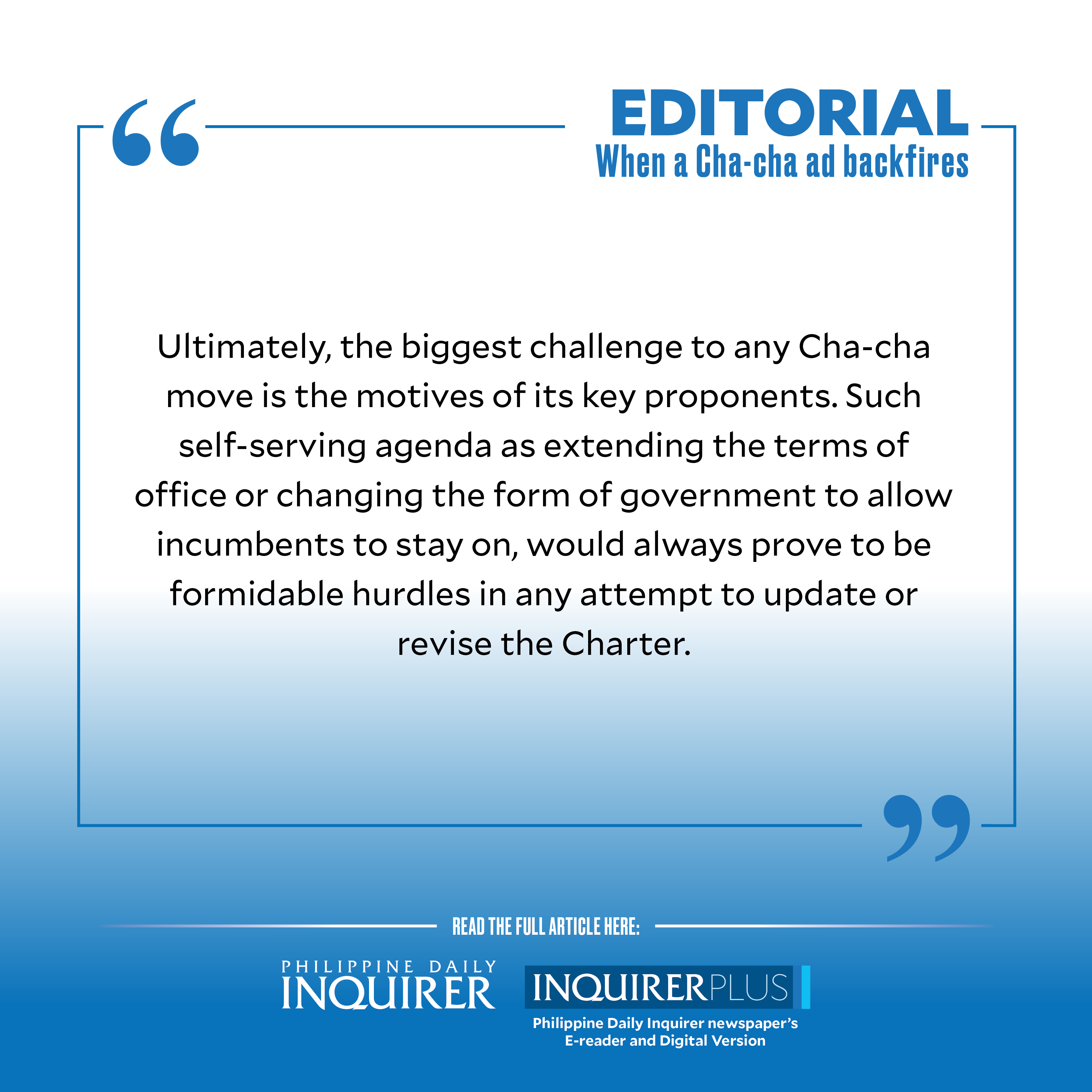
If the intent had been to generate public discussion, some proponents of current moves to amend the 1987 Constitution have certainly succeeded—in a negative way.
A television commercial blaming the “defective 1987 Constitution” for the country’s problems today has drawn criticism for denigrating the 1986 Edsa People Power Revolution that ended martial law and restored democracy, with a new charter crafted in its aftermath.
The ad’s tagline “Edsa-pwera,” a play on the term “etsapuwera” which means excluded, sought to downplay the bloodless revolution’s inclusive character, a poorly thought stunt that backfired if the intention was to gather public support for Charter change (Cha-cha).
“That was just a creative way to attract the attention of people (to provoke) public discussion,’’ said Alex Avisado, senior partner of the Gana Atienza Avisado law firm that was behind the commercial. The same firm was part of the People’s Initiative for Reform, Modernization, and Action (Pirma) that launched an unsuccessful people’s initiative in 1997.
Ad hominemInstead of generating an enlightened discussion on Charter change, the ad antagonized those who believe that the 1987 Constitution—which was drafted by some of the most independent-minded individuals with utmost integrity—has expanded the freedom they regained at Edsa.
The ad hominem served to divide rather than unite the people behind the current “people’s initiative” being pushed by members of the House. By employing an Us-versus-Them tactic, the commercial sought to win through the tyranny of numbers, rather than the force of argument.
For indeed, any Constitution can be revised or amended for the right reason. Under our law, there are three ways provided for doing that: through Congress sitting as a constituent assembly; a constitutional convention of elected delegates, or a people’s initiative through a direct petition of at least 12 percent of registered voters with at least 3 percent from every legislative district.
Underhanded movesEvery administration after Edsa I, except for the two Aquino presidencies, sought to tinker with the Constitution for varying reasons. There was the long campaign for a federal system, as well as changing the form of government from presidential to parliamentary. Another, more sinister, motive was to lift the term limit of elected officials to benefit the incumbents and the political dynasties that have long held sway in our national life. The current campaign being pushed in Congress is purportedly meant to fix some economic provisions in the Charter seen to discourage foreign investments.
President Marcos, who previously did not consider Cha-cha a priority, has recently said that his government was considering the economic amendments to attract more foreign investors. The proposal to amend the economic provisions of the Constitution has been supported by the League of Cities of the Philippines and some prestigious business groups in the country.
Roadblock from the SenateThere are reports that for alleged certain considerations, signatures are being gathered to support the proposal for Congress to amend the Charter by a three-fourths vote of all its members voting as one. This would overcome the roadblock from the Senate that has historically been against Cha-cha, and has always insisted that the intent of the Constitution was for the two houses to vote separately. With more than 300 members versus the 24 senators, the House can well launch a successful Cha-cha move within the term of the President if the proposal were approved in a plebiscite.
These allegations do not help the cause being advanced by the President and leaders of the House, who should stop those behind the nefarious scheme as it tarnishes their leadership.
The proponents only need to learn from similar failed attempts in 1997 and 2006 when the Supreme Court struck down such move as anything but a genuine initiative from the people.
Constitutionally infirmIn 2006, the high court struck down the “constitutionally infirm” people’s initiative during President Gloria Macapagal Arroyo’s term, which proposed a shift to a parliamentary form of government. The proposal was a revision, not an amendment that can be done through people’s initiative, the Supreme Court ruled. More importantly, the six million signatures were “deceptively gathered,” it added.
The Pirma initiative during the term of President Fidel Ramos was also dismissed by the high court for lack of an enabling law and for being defective.
Ultimately, the biggest challenge to any Cha-cha move is the motives of its key proponents. Such self-serving agenda as extending the terms of office or changing the form of government to allow incumbents to stay on, would always prove to be formidable hurdles in any attempt to update or revise the Charter.
Cha-cha proponents should get back to the drawing board to come up with a more credible, more transparent, and more acceptable way of amending the Constitution that would truly serve the people better.

